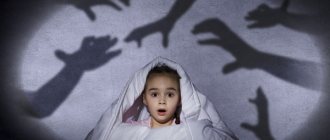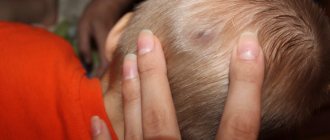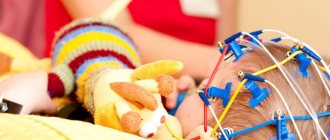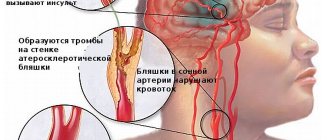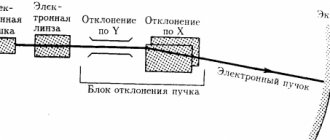Share
A young mother always has a lot of worries. The best reward for her is rest next to a soundly sleeping baby. However, if a child twitches in his sleep, then one can only dream of proper rest.
Added to this negative aspect are concerns about the baby’s health. What to do if such problems are discovered? Which doctor should I contact? When to take action? The answers to all these questions are important. They are given in the text of this review.
Physiological reasons
Doctors assure that twitching while falling asleep and during sleep is a normal condition for children under one year old. During this period, babies adapt to the world around them; their organs and systems still continue to develop, which can cause muscle spasms. The functioning of the nervous system of toddlers is not fully debugged; their sleep phases change much more often than the sleep phases of an adult. The transition from REM (shallow) sleep to slow-wave (deep) sleep is often accompanied by a start.
Experts also identify a number of other reasons why toddlers may twitch:
- Premature birth. Twitching of a baby who was born prematurely should not worry parents. This is a completely normal phenomenon associated with the imperfection of the nervous system.
- Excessive mobility. Very active children experience muscle contraction while falling asleep, as it is more difficult for them to switch to rest due to the strong stimulation of the nervous system.
- Overwork. Very active toddlers get very tired during the day, they experience a lot of different emotions, both positive and negative. It is because of physical and psychological stress that twitching may occur while going to bed.
- Dreams. A child shudders in his sleep because he dreams. Doctors believe that dreams come to babies while still in the womb, and after the baby is born they become even more vivid and realistic. The toddler can not only twitch, but also smile or even laugh, waving its legs and arms.
- Hypnagogic fright. This is a condition in which spasm occurs due to muscle contraction. At the same time, the baby sees a dream in which he falls somewhere or flies. Children can even wake up from such sensations, but if they do not have serious pathologies, the feeling of anxiety and fear quickly passes, and the little ones fall asleep again.
- Development of the organism. The development of the baby's systems and organs is accompanied by unpleasant sensations. Toddlers may be bothered by colic in the tummy, which accompanies adaptation to food digestion.
Teething is also painful for children. These processes can cause twitching of the feet, legs, arms and facial muscles during sleep and falling asleep.
Natural reasons why a child starts in his sleep
You may not know, but adults, like newborns, also startle when they fall asleep or are not fast asleep. This is due to the phases of sleep. There are only two of them - slow and fast.
Slow is divided into 4 stages:
- Falling asleep. Lasts up to 10 minutes, characterized by decreased muscle activity
- Shallow sleep. Duration – 20 minutes. The heart rate slows down and body temperature decreases.
- Deep sleep (stages 3–4). Lasts 30–40 minutes. The baby sleeps soundly, but it is during these stages that sleepwalking and nightmares occur.
The fast phase is a continuation of deep sleep, the stage of awakening. It lasts 5–10 minutes. It is in this phase, as well as at the stage of falling asleep, that startles in children are possible in their sleep. This is due to a change in nervous excitability, with the transition from wakefulness to rest.
The phenomenon when a child shudders when falling asleep is called “hypnic myoclonus” in medicine. Severe flinching in infants is associated with incomplete myelination of nerve fibers.
Uncomfortable position
Any discomfort during sleep will be manifested by shuddering. This may be an uncomfortable position, or clothes that don’t fit.
Children who already know how to roll over on their side or stomach get scared when they change position. Woke up, they cannot understand what happened.
Loud noise or bright light
The nervous system of a newborn is immature, so the reaction to any irritants can be acute. Even an unexpected touch causes a flinch.
Reflexes
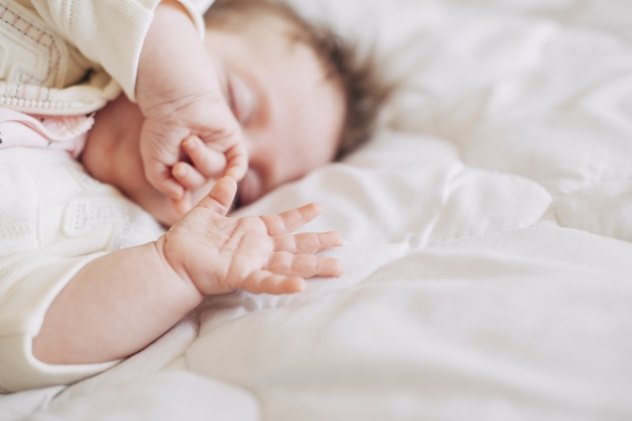
The reason why a child flinches in his sleep may be the Moro reflex. This is a natural protective reaction that disappears by 4–5 months. Occurs from loud sounds, due to an uncomfortable posture, or when changing position.
How does it manifest? Every newborn has a set of innate reflexes for survival. So the Moro reflex is one of them. When the baby has a feeling of falling, he puts his hands forward and tries to maintain balance, as a result - crying and flinching.
Teething
Painful sensations can lead to flinching. When teething, the baby sleeps restlessly, his arms and legs twitch, he often changes position, spins in the crib, and suddenly starts crying.
Bad dream
Older children shudder due to nightmares, and twitching is observed not only in their arms or legs, but even in their closed eyelids. The child wakes up in tears, it is difficult to calm him down, because he perceives the dream as reality.
Overexcitement
For a normal psycho-emotional state, young children need proper rest and a routine must be followed. It is overexcitation, active games before bed, oversaturation with any emotions during the day, stress that leads to the fact that an infant shudders in his sleep.
In children under the age of one month, it is normal for their arms and legs to twitch and their chin to tremble while crying. This is due to the immaturity of the nervous system.
Pathological causes
Parents themselves can recognize the pathology in the baby’s twitching; to do this, it is worth carefully monitoring how the baby behaves during rest and wakefulness. If your child wakes up several times during the night, cries, screams and looks unhealthy, it is worth visiting a doctor.
The following symptoms accompanying twitching should cause concern:
If you notice any of the symptoms that we described above, you need to contact your pediatrician. He may refer you to see a neurologist. This specialist conducts hardware research to identify the causes of the child's twitching during bedtime and rest itself. If the fontanel is not yet overgrown (up to 18 months), an ultrasound examination of the brain is prescribed.
It is also possible to perform magnetic or computed tomography, but these procedures are performed under general anesthesia, since the baby cannot lie quietly in the closed space of the device.
Drawing conclusions
Babies may startle when falling asleep or during sleep quite often. In most cases, this condition is not pathological and does not require drug treatment.
But if you notice that the twitching has been accompanied by additional symptoms, you should not hesitate to visit the doctor.
Sometimes reflex muscle contraction indicates the presence of serious health problems. Monitor your child closely and seek professional help promptly if you notice any abnormalities.
Mothers of babies sleep lightly, waking up from any sound from the crib. They care about everything: how the baby breathes, which side he sleeps on, body temperature. And if a clogged nose is a completely predictable phenomenon, then when a child twitches in a dream, every woman panics. Why do shudders happen, and is it so dangerous?
Baby 3 months old - wakes up and cries
the child twitches sharply
My soul is torn to pieces... Today I firmly realized that I am a bad mother... And I even thought that I feel sorry for my child, because he got a mother like me... And this is not some kind of snot like “OH I DIDN’T ATTENTION, OH I DIDN’T PLAY OR I DIDN’T WIPE MY ASS IN TIME.” I clearly REALIZED today that I am not doing what my child needs. I destroy it, this is the worst thing, at this age, when it is forming, I, mother, destroy my child.
To make it clear, a child grows up hyperactive, very inquisitive, climbs everywhere, picks up everything on the street, studies the world around him every second, tries everything, wants to know everything.
Such children need a special approach; they should not be jerked, spoken harshly, or banned without explanation.
And such a child got a crazy hysterical person - me. I am very unbalanced (really, without exaggeration), I can say 2-3 times, and then suddenly grab my hand and pull it away, shouting “I’ve already repeated it a hundred times, don’t touch it!” Then this causes hysterics in my son and sometimes it is impossible to stop these hysterics, he roars until he is exhausted. Until he gets tired of crying and falls asleep (if at home), he can yell for 40 minutes, or even an hour, or even more.
Lately, my son has also begun to raise his voice and be harsh and rude, I see that he is adopting this from me. He began to want to visit his grandmother more and more and does not like to spend time with me.
We also have neurological problems since birth (difficult childbirth), and there are periodic twitches on the face. Then we drink some potion and it goes away for a while. Now the signs have appeared again, wrinkling of the nose and blinking of the eyes. Such a child should grow up in a calm environment and with a mother as calm as a tank.
And today I understood. IT IS FORBIDDEN!!! this must be stopped! I want to promise myself today, in front of everyone who sees it, and most importantly before God and before my son! I won’t scream and tug at him anymore, I’ll explain the same thing a hundred times and find the strength not to get irritated. After all, I love him so much and I don’t want to ruin his life and health with my behavior. I don't want to alienate him from me. I want my home to be a calm nest for him and a place from where he doesn’t have to run to a woman, where they will always understand and explain. I start today from this day! And I won't be in trouble if I don't fulfill my plan. Yes, it will be hard, I won’t become different in one day, but it’s never too late to change!!! Thank you if anyone can read this to the end, but this is more for me, in order to record the starting point of our happy life!
Transition between sleep stages
Most often, a child's twitching occurs at the moment of falling asleep. This phenomenon also occurs in adults, and is easily explained from a medical point of view.
Human sleep is periodic, consisting of slow and deep phases, while the cycle that replaces them lasts only 50 minutes in a month-old baby. When falling asleep, an adult goes into deep sleep almost immediately, while a baby sleeps lightly for the first 20-30 minutes.
Thematic material:
When the phases change, the so-called shudder occurs. An adult at this moment may dream that he is falling into an abyss or flying quickly. A muscle spasm that causes the body to twitch is a defensive reaction to the body slowing down its processes.
In medicine, this is called hypnagogic fear. Both the adult and the child sometimes wake up at this moment.
When to sound the alarm?
First of all, determine the nature and regularity of the child’s winces. If during sleep the baby twitches no more than 10 times, and after waking up quickly falls asleep, there is nothing to worry about.
When, at the same time as this phenomenon, you observe the baby’s general anxiety, increased excitability and signs of ill health, you should contact your pediatrician. He will help determine the nature of the dysfunctions in the body and refer you to the right doctors.
Why do shudders appear against the background of neurology? Similar disorders are observed in premature newborns or children who have suffered hypoxia during childbirth.
Excess vitamin D, as well as calcium and iron deficiency, can cause unexpected shuddering.
Increased intracranial pressure, like a number of other pathologies of the nervous system, is a consequence of difficult childbirth, accompanied by sleep disturbances and a general restless state of the newborn.
Useful video about when a child needs to be shown to a neurologist
List of sources:
- Mindell JA, Owens JA A clinical guide of pediatric sleep: diagnosis and management of sleep. Philadelphia, PA: Lippincott Williams & Wilkins, 2010.
- Sadech A. Cognitive-behavior treatment for childhood sleep disorders // Clin. Psych. Rev. 2005. Vol. 25. No. 5. P. 612-628.
- Levin Ya. I. Parasomnias: current state of the problem // Epilepsy. 2010. No. 2. P. 10-16.
Author
Oksana Belokur
Pediatrician
In 2012 she graduated from the Medical Institute of Sumy State University. She received a higher education in the specialty “Pediatrics” and qualified as a doctor. In 2012-2013, there were treatment and preventive activities at the Sumy Regional Children's Hospital. In 2013-2015 worked as a local pediatrician at Children's Clinic No. 2. I am currently on maternity leave. In my free time I do embroidery and knitting, and study English. All articles by the author
I like!
Trembling or convulsions?
It is extremely important to separate these two concepts, since seizures are symptoms of serious diseases and a reason for hospital observation.
If a child twitches rhythmically and continuously in his sleep, and when he is picked up, the phenomenon does not stop, we are talking about the second.
By the way, in ordinary children, without a predisposition to epileptic seizures, seizures rarely occur, mainly during elevated body temperatures.
Why is this dangerous? Reaching critical levels, the temperature in infants can cause brain damage. And convulsions in this case are a precursor to an impending threat.
Monitor body temperature especially carefully in children in the first months of life. The younger the child, the more serious the consequences may be.
Pathological causes of shuddering in a newborn
Although it is more common for a newborn to wince for harmless reasons, signs that indicate pathology may appear.
Substance deficiency, rickets
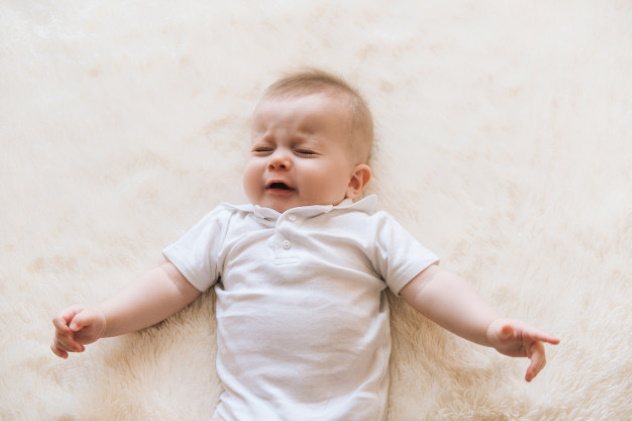
Sometimes a newborn shudders in his sleep due to a deficiency of vitamin D. A lack of this substance leads to convulsions, and in the near future to rickets, which can be diagnosed as early as 2-3 months.
Vitamin D deficiency can be recognized by the following symptoms:
- tearfulness, anxiety;
- increased excitability;
- frequent shuddering, restless sleep;
- increased sweating;
- sour odor from the skin;
- pumping out hair on the back of the head.
In the later stages, deformation of the skull, chest, spine, and limbs is noticeable.
Problems in the gastrointestinal tract
A one-month-old baby often shudders due to tummy problems. Bloating and intestinal colic interfere with sleep. The baby begins to cry in his sleep, becomes restless, draws up his legs, knocks them on the bed, bends his back, makes grimaces in pain.
The cause of shuddering may be:
- bloating;
- intestinal colic;
- overfeeding;
- fast feeding or incorrect posture;
- stool disorder;
- lactase deficiency;
- inflammatory bowel diseases.
With bloating, colic and other problems with the gastrointestinal tract, tension in the abdominal muscles is observed.
PNVR
The syndrome of increased neuro-reflex excitability often occurs at 1–4 months due to perinatal pathologies of the central nervous system, intrauterine hypoxia, unfavorable pregnancy, and birth injuries.
Symptoms of PNVR:
- increased excitability;
- flinching;
- restless sleep;
- hyperactivity;
- crying for no reason;
- tremor of the chin, limbs;
- throwing the head back;
- arching of the body when crying;
- frequent and profuse regurgitation;
- increased sweating.
PNVR needs to be treated and a consultation with a neurologist will be required.
Neonatal seizures

They are fairly easy to recognize as they appear both at night and during the day. They always occur with cerebral disorders, so the newborn should be shown to a neurologist.
Low-grade seizures
Thermoregulation of newborns is imperfect, so high temperatures can cause seizures. In this case, it is necessary to give an antipyretic and urgently call an ambulance.
"Recipe" for flinching
Of course, there are no instructions or medications that would help eliminate the causes of the unpleasant phenomenon. But you can improve your sleep and make it last longer.
- Observe temperature conditions. Cool, moist air, according to Komarovsky, will save you both from and during illnesses. Science has also proven that the sleep hormone is better produced in the cold. Therefore, ventilate even in frosty conditions, do wet cleaning and remove heaters that dry out the air.
- Control your emotional background. Think about it: if your baby is constantly wincing, maybe you are too aggressive with him or are not paying enough attention while he is awake.
- Dose your impressions. It's hard to guess what will amaze your baby more during the day - an unfamiliar aunt or a butterfly fluttering in front of his face - all of this will come back to haunt him. But reducing activity before bedtime, helping the baby relax, and settling into peace is the task of parents.
views

